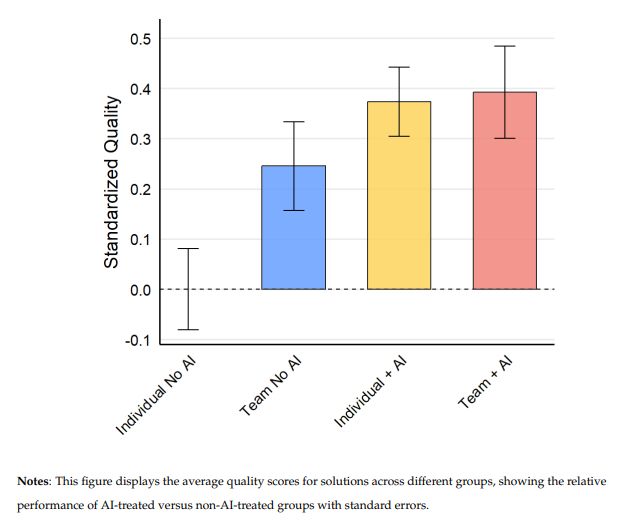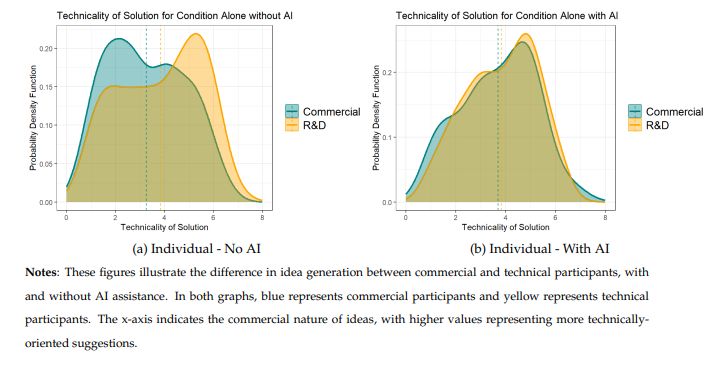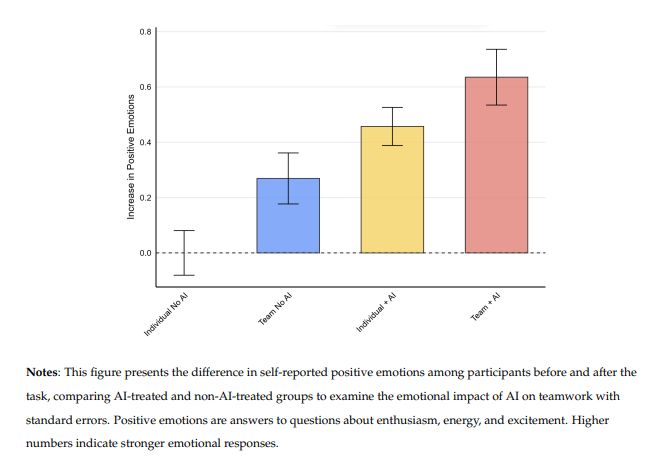Someone has created a gmail account using my first and last name (raffaellasadun@gmail.com) without my consent.
If you receive an email from this gmail account please know that it is not me, and please alert me. This is an impersonator using my name to ask for money.
22.02.2026 16:46 —
👍 1
🔁 1
💬 0
📌 0

📢Job vacancy: POID is hiring a Research Assistant to with John Van Reenen on cutting-edge research on innovation, difussion and productivity, contributing to co-authored, top-journal-quality outputs.
Apply 👉: ow.ly/vRLL50XZz98
📅 Deadline: Monday 16 February
20.01.2026 10:53 —
👍 1
🔁 1
💬 0
📌 1
Empirical Management Conference 2026 – World Management Survey
This year's Empirical Management Conference is at Stanford, May 27-29!
Send us your best papers! Details and submission form here:
worldmanagementsurvey.org/emc2026/
JOIN US!! It's fun, I promise!
@raffasadun.bsky.social @johnvanreenen.bsky.social @renatalemos.bsky.social @nickbloom.bsky.social
14.01.2026 17:25 —
👍 5
🔁 8
💬 0
📌 2
How Do Chief Executive Officers Make Strategy? | Management Science
Very happy to see this paper in (online) print. Together with Michael Christensen, @raffasadun.bsky.social , @nickbloom.bsky.social and Jan Rivkin, we interviewed hundreds of CEOs to measure how they make business strategy.
pubsonline.informs.org/doi/10.1287/...
30.09.2025 15:25 —
👍 4
🔁 1
💬 1
📌 0
Deadline is approaching!
Send us your best work by September 1st 2025.
27.08.2025 13:56 —
👍 3
🔁 2
💬 0
📌 0
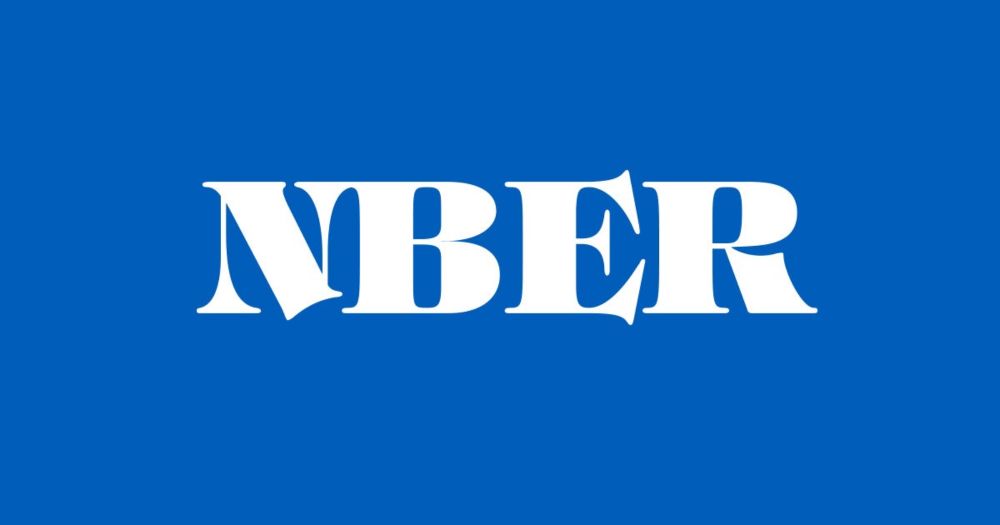
Submission: Organizational Economics Working Group, Page 1 of 2 - MyNBER
The call for papers for the next @nber.org Organizational Economics Working Group is up!
We will meet in Cambridge, MA on November 13 and 14 2025.
Please submit your paper by September 1st 2025 at:
conference.nber.org/confsubmit/b...
31.07.2025 19:27 —
👍 5
🔁 2
💬 0
📌 1
📢 Stiamo cercando 1 Research Associate per un'esperienza di lavoro pre-doc all'#EvaluationLab del #FondoRepubblicaDigitale.
👉 www.fondorepubblicadigitale.it/posizioni_ap...
cc: @raffasadun.bsky.social @barbarabiasi.com @francedrago.bsky.social
03.06.2025 17:07 —
👍 0
🔁 1
💬 1
📌 1
Our work now published showing how better AI can improve both accuracy and diversity in hiring relative to supervised learning tools and status-quo human hiring.
02.06.2025 18:50 —
👍 63
🔁 18
💬 3
📌 0
In short: good management doesn’t just improve performance—it reshapes organizations.
With Rachel Schuh, John Hartley, @nickbloom.bsky.social and @johnvanreenen.bsky.social .
Full paper 👉 www.nber.org/papers/w33765
#economics #productivity #management #reallocation #research
12.05.2025 14:59 —
👍 3
🔁 1
💬 0
📌 0
Key takeaways:
— Well-managed firms buy, sell, open, and close more plants
— They pass on good practices to new and acquired units
— Banning M&A would lower GDP and management quality by ~15%
— About 20% of productivity gaps across countries are management-related
12.05.2025 14:59 —
👍 2
🔁 0
💬 1
📌 0
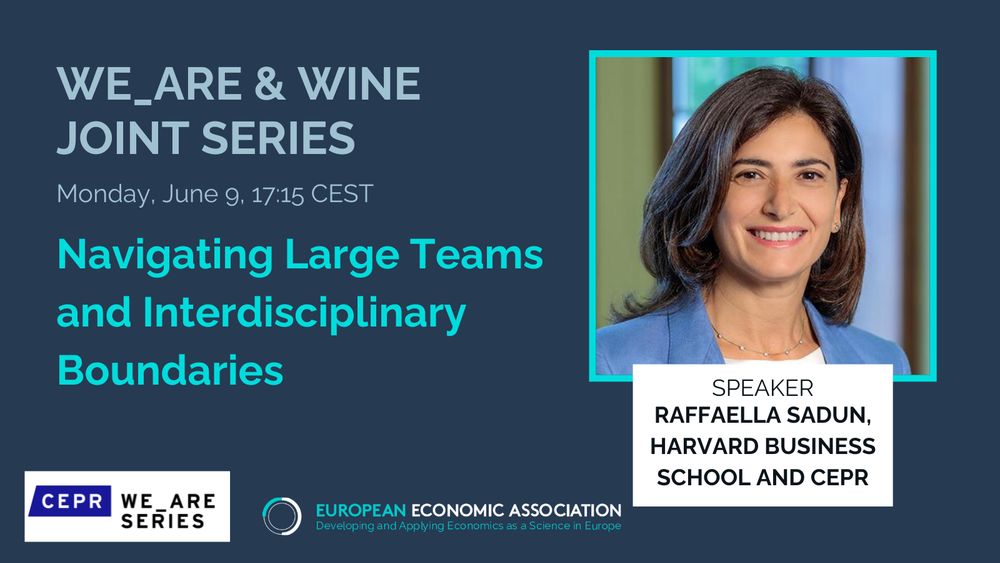
📢@cepr.org WE_ARE & EEA #womenineconomics committee announce joint virtual session:
Speaker: @raffasadun.bsky.social
Topic: Navigating Large Teams & Interdisciplinary Boundaries
🗓️Mon, June 9 @ 17:15 CEST
ℹ️https://bit.ly/44YA1RA
@womeninecon.bsky.social @ukwen.bsky.social
@isweconomics.bsky.social
08.05.2025 12:04 —
👍 3
🔁 1
💬 0
📌 1
So what’s the takeaway?
If you want training to work, you need more than money or policy.
You need middle managers who believe in people—and are trusted in return.
14.04.2025 15:55 —
👍 9
🔁 2
💬 1
📌 0
Why? We built a simple model:
Workers only invest in training if they trust that promotions will follow. That trust is manager-specific.
A good manager makes incentives real.
14.04.2025 15:55 —
👍 8
🔁 0
💬 1
📌 0
nd it went beyond training.
Teams led by HT managers:
✅ Performed better
✅ Were promoted more
✅ Had less absenteeism—even during major organizational changes.
14.04.2025 15:55 —
👍 6
🔁 1
💬 1
📌 0
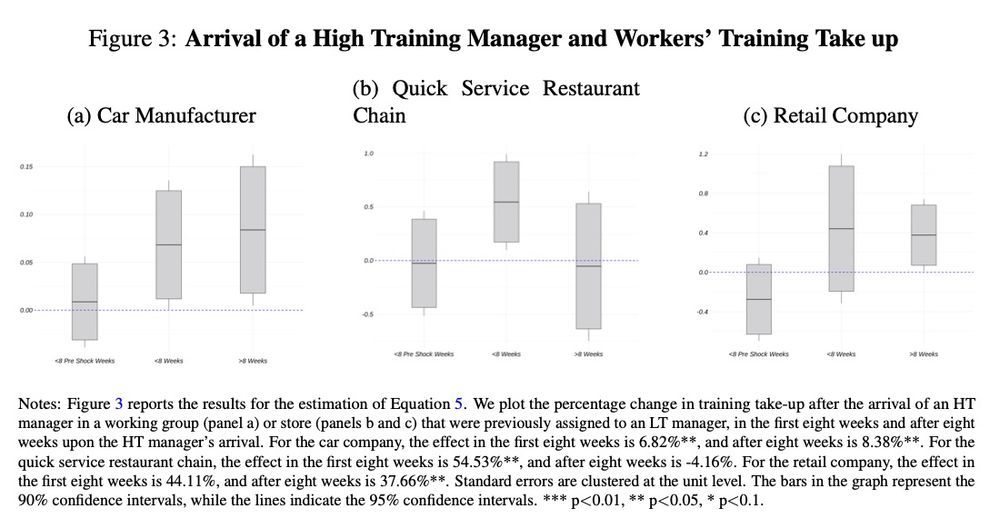
These “High-Training” (HT) managers didn’t get paid more for encouraging training. But they nudged, supported, and believed in their team’s growth.
When an HT manager arrived, participation jumped:
📊
14.04.2025 15:55 —
👍 5
🔁 2
💬 1
📌 0
That variation could be explained by one thing: who the middle manager was.
Managers who were people-focused, proactive, and cared about development boosted training take-up by 45–60% compared to others.
14.04.2025 15:55 —
👍 5
🔁 0
💬 1
📌 0
We studied 3 large Latin American firms—a car manufacturer, a retailer, and a fast-food chain. All three offered centrally designed, firm-specific training. Same incentives, same structure.
But participation varied dramatically across teams.
14.04.2025 15:55 —
👍 2
🔁 0
💬 1
📌 0
📣 New paper drop!
Why do some employees take up training and others don’t, even when the programs are the same?
Surprisingly, the answer isn’t HR policy—it’s middle managers.
🧵
14.04.2025 15:55 —
👍 32
🔁 11
💬 2
📌 3
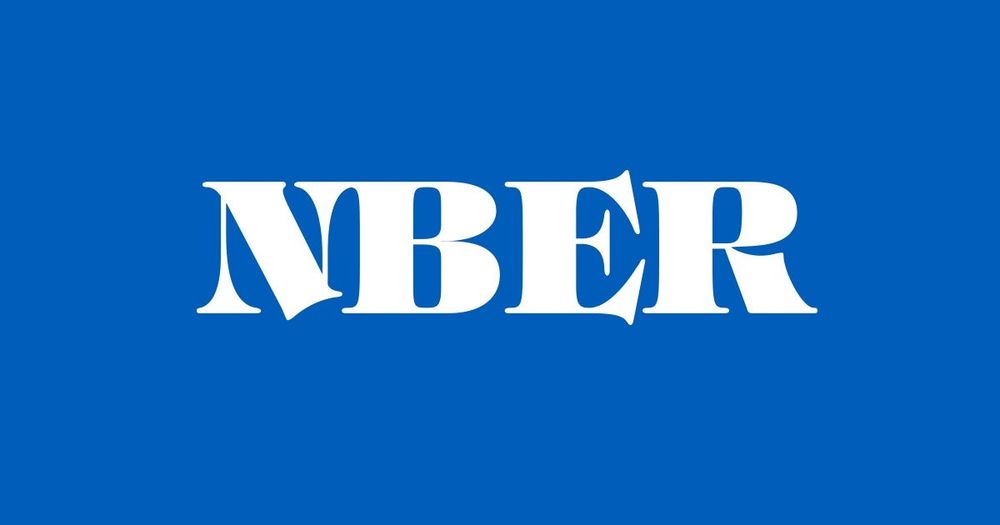
Organizational Economics Working Group, Spring 2025
Another excellent NBER Org meeting wrapped up, and it's available on YouTube!! www.nber.org/conferences/...
@raffasadun.bsky.social and @andreaprat.bsky.social nailing the program and discussants yet again. Love this group! Thanks to all and looking forward to seeing old friends and new faces soon
11.04.2025 17:16 —
👍 9
🔁 1
💬 0
📌 0
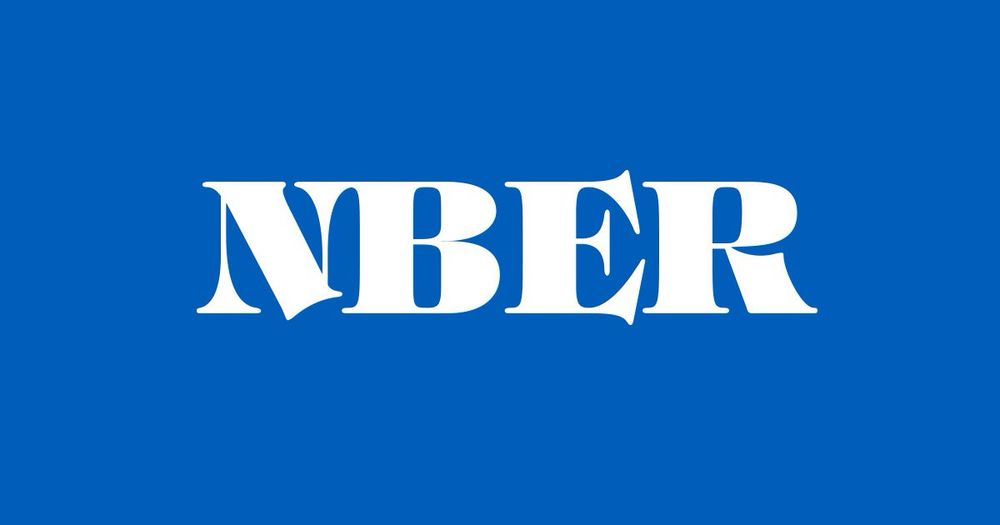
Organizational Economics Working Group, Spring 2025
Looking forward to the next @nber.org Organizational Economics Working Group meeting on April 10/11, coorganized with @andreaprat.bsky.social. We have a great line-up of new research papers in Org Econ!
Program and livestream link:
www.nber.org/conferences/...
09.04.2025 00:21 —
👍 11
🔁 4
💬 0
📌 0
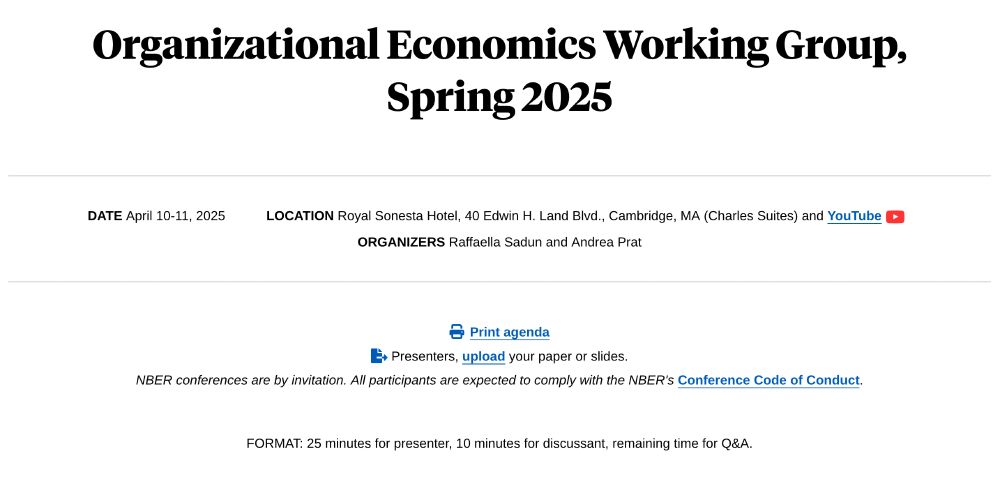
Excited for the NBER ORG meeting this week! Thanks Raffaella Sadun & Andrea Prat for leading this forward-thinking group exploring fascinating topics, including AI and labor markets. Enjoyed discussing Anna’s paper on class gaps last fall—delighted to return!
08.04.2025 17:01 —
👍 3
🔁 2
💬 1
📌 0
If you'd like to teach about the new economics of supply networks and their fragility this spring (see thread below for an application), here's a short list of broadly accessible resources you might find useful.
07.04.2025 11:42 —
👍 39
🔁 15
💬 3
📌 0
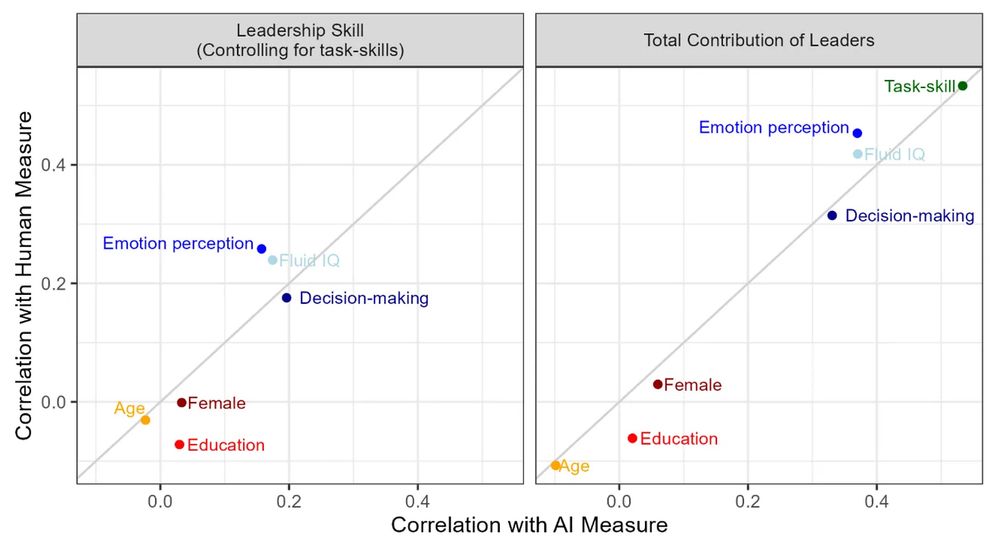
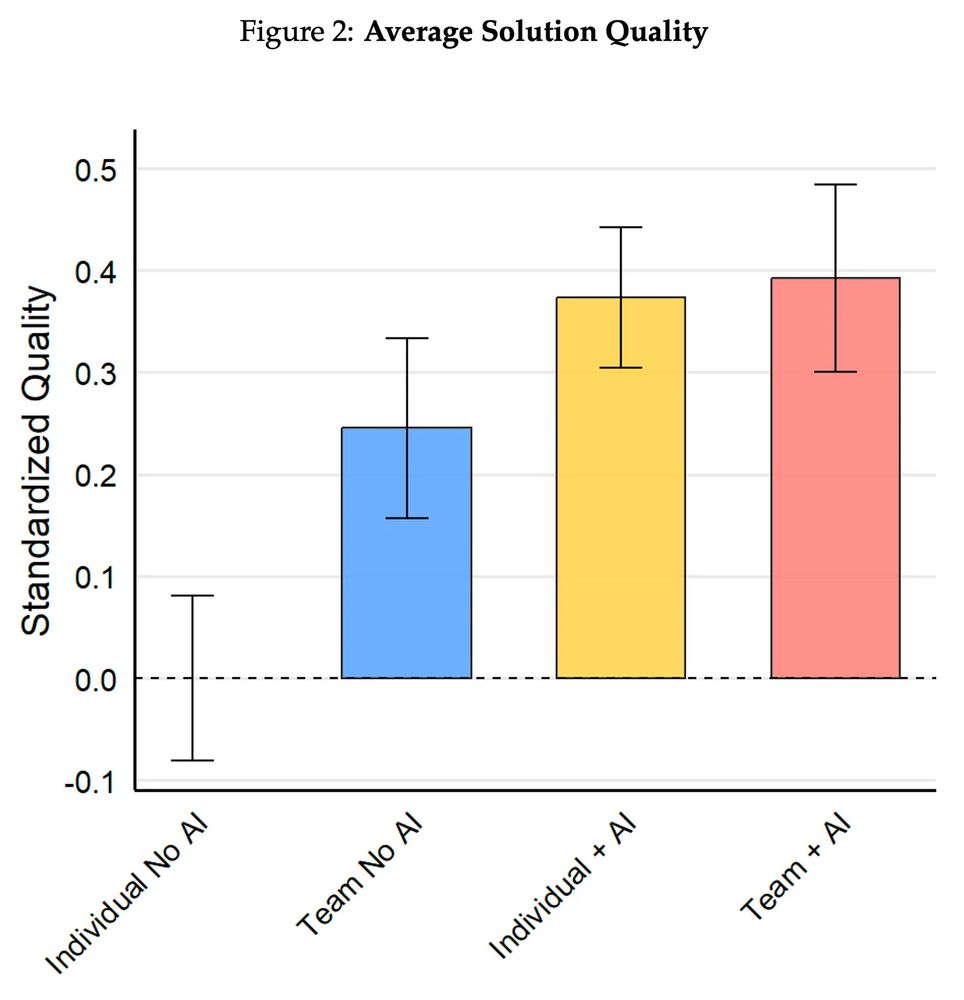
"deep expertise combined with the social skills and self-awareness to know your own weaknesses is a winning combination in the AI-fueled labor market of the future" - cool new results AI's contribution to problem-solving forklightning.substack.com/p/ai-human-t...
07.04.2025 12:07 —
👍 22
🔁 4
💬 0
📌 1
V nice paper, cited in my new book (along with much more about what economic statistics are missing these) 🙂: press.princeton.edu/books/hardco...
21.03.2025 08:22 —
👍 57
🔁 11
💬 2
📌 0
Welcome Marty!
12.03.2025 15:55 —
👍 1
🔁 0
💬 0
📌 0












